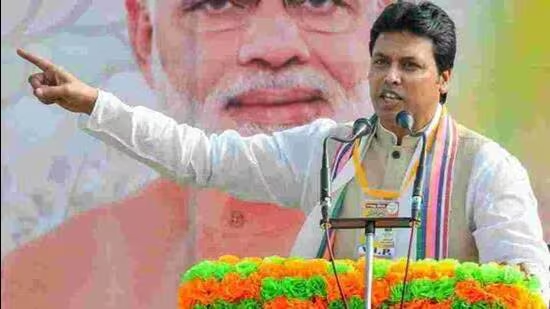Biplab Kumar Deb, the Lok Sabha MP from Tripura and former Chief Minister, recently delivered a pointed critique of the Congress party’s history in the state, accusing it of paving the way for communist dominance. Speaking at a public event, Deb claimed the Congress had operated as a family-centric political entity, prioritizing dynastic interests over genuine governance. He alleged this approach weakened the state’s democratic framework, ultimately handing over power to the communists, who ruled Tripura for decades.
Deb asserted that the Congress party’s failure to provide effective leadership and address grassroots issues allowed the Communist Party of India (Marxist) to thrive. He said that instead of focusing on development, Congress leaders had been preoccupied with internal power struggles and familial agendas. This neglect, he argued, created a vacuum that the communists exploited, leading to prolonged socio-economic stagnation in the state.
Highlighting the transformation under Bharatiya Janata Party (BJP) rule, Deb praised the leadership of Prime Minister Narendra Modi and Union Home Minister Amit Shah for their vision and policies. According to him, the BJP’s governance model prioritizes inclusive development, infrastructure expansion, and empowering citizens. Deb pointed to major initiatives in Tripura, including improved connectivity, healthcare, and education, as evidence of the party’s commitment to progress.
The MP emphasized that the BJP’s rise in Tripura marked a break from the past, ushering in an era of transparent governance and rapid development. He credited the efforts of grassroots BJP workers and local leaders for helping the party secure its historic 2018 victory, which ended the Left Front’s 25-year rule. He also applauded the dedication of state leaders in implementing central schemes and addressing local challenges, which he believes have resonated with the people.
Deb’s speech reflected his belief that BJP’s governance under Modi and Shah represents a departure from both Congress and communist ideologies. He described the BJP as a party of the people, driven by accountability and results. He argued that initiatives like Ayushman Bharat, Jal Jeevan Mission, and Pradhan Mantri Awas Yojana demonstrate the government’s focus on empowering marginalized communities and enhancing their quality of life.
He also acknowledged the challenges of rebuilding Tripura after years of neglect, citing examples of inadequate infrastructure and limited industrial growth during the previous regimes. However, he expressed confidence that the BJP’s policies are successfully addressing these issues. He pointed to the development of highways, railways, and international trade corridors as milestones in the state’s journey toward becoming an economic hub in the Northeast.
In his critique of the Congress, Deb suggested that the party had lost relevance in Tripura due to its inability to adapt to changing political dynamics. He accused its leaders of being disconnected from the aspirations of the people, which, he argued, led to their diminishing influence in the state. According to him, the Congress’ failure to evolve and address grassroots concerns is why it has become a marginal player in Tripura’s political landscape.
The former Chief Minister urged the people of Tripura to continue supporting the BJP to sustain the momentum of development. He outlined the party’s vision for the state, which includes further investment in education, healthcare, and technology to create employment opportunities and enhance living standards.
Deb concluded his speech by reiterating his confidence in Modi’s leadership and the BJP’s ability to transform Tripura into a model state. He appealed to citizens to reject dynastic politics and communist ideologies, emphasizing that the BJP’s governance is rooted in accountability and a commitment to the people’s welfare.
His remarks have drawn sharp responses from the Congress, which dismissed his claims as baseless and accused the BJP of using divisive rhetoric to distract from its shortcomings. The Congress leadership in Tripura has maintained that its past governance laid the foundation for the state’s progress, and it continues to advocate for inclusive development.
While political debates persist, Deb’s comments reflect the BJP’s strategy of emphasizing its governance record while drawing contrasts with its rivals. As Tripura approaches future elections, these narratives will likely shape the state’s political discourse.


